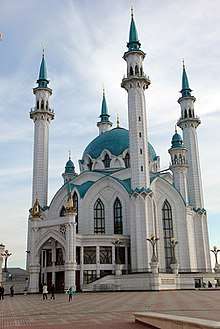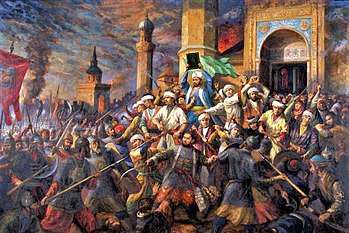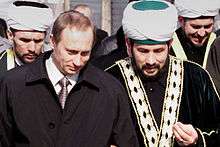Islam in Tatarstan
Established in 922, the first Muslim state within the current Russian borders was Volga Bulgaria from whom the Tatars inherited Islam. Islam in Russia has had a long presence, extending at least as far back as the conquest of the Khanate of Kazan in 1552, which brought the Tatars and Bashkirs on the Middle Volga into Russia. Today, Islam is a major faith in Tatarstan, as 38.80% of the estimated 3.8 million population is Muslim.[1][2]

Marat Gatin is the minister for Interaction with Religious Organizations, a Presidential department.[3]
History
The earliest known organized state within the boundaries of Tatarstan was Volga Bulgaria (c. 700–1238 CE). The Volga Bulgars had an advanced mercantile state with trade contacts throughout Inner Eurasia, the Middle East and the Baltic, which maintained its independence despite pressure by such nations as the Khazars, the Kievan Rus and the Kipchaks. Islam was introduced by missionaries[4] from Baghdad around the time of Ibn Fadlan's journey in 922.

In the 1430s, the region became independent as the base of the Khanate of Kazan, a capital having been established in Kazan, 170 km up the Volga from the ruined capital of the Bulgars. The Khanate of Kazan was conquered by the troops of Tsar Ivan IV the Terrible in the 1550s, with Kazan being taken in 1552. Some Tatars were forcibly converted to Christianity and cathedrals were built in Kazan; by 1593, mosques in the area were destroyed. The Russian government forbade the construction of mosques, a prohibition that was not lifted until the 18th century by Catherine II. The first mosque to be rebuilt under Catherine's auspices was constructed in 1766–1770.
Soviet rule
On May 27, 1920 the Tatar Autonomous Soviet Socialist Republic of the RSFSR was declared. Under Joseph Stalin, the Soviet Union began to place restrictions on the use of the Tatar language, which used a variant of Arabic script. The Tatar alphabet switched to Cyrillic. The development of national culture declined significantly and religion in Tatarstan was severely repressed.
According to Ruslan Kurbanov, an expert on Islam in modern Russia, Tatars have demonstrated a very constructive and effective way of developing their religious and national identity and widening their political autonomy within Russia. In the most difficult years of post-Soviet Russian history — years of deep economic crisis and two Chechen wars — Tatars demonstrated phenomenal results in the economic development of their national republic.[5]
1921–22 famine in Tatarstan
The 1921–1922 famine in Tatarstan was a period of mass starvation and drought that took place in the Tatar ASSR as a result of war communism policy,[6][7] in which 500,000[8] to 2,000,000[9] peasants died. The event was part of the greater Russian famine of 1921–22 that affected other parts of the USSR,[10] in which up 5,000,000 people died in total.[11][12] In 2008, the All-Russian Tatar Social Center (VTOTs) asked the United Nations to condemn the 1921-22 Tatarstan famine as genocide of Muslim Tatars.[13][14]

Demographics
The majority faith in Tatarstan is Islam.[15] In 1990, there were only 100 mosques but the number, as of 2004, rose to well over 1000. As of January 1, 2008, as many as 1398 religious organizations were registered in Tatarstan, of which 1055 are Muslim. Many of the Muslims in Tatarstan are practising.[16] Increased religiosity has been evident amongst Muslims and interfaith relations remain very strong.[17][18][19][20][21]
Recent developments
In September 2010, Eid al fitr as well May 21, the day the Volga Bulgars embraced Islam, were made public holidays.[22] Despite the holiday, students protested a Kazan Federal University administration's decision to hold classes on Eid with some declaring their intention to skip class and attend mosque services.[23] Tatarstan also hosted an international Muslim film festival which screened over 70 films from 28 countries including Jordan, Afghanistan and Egypt.[24] The first halal food production facility opened with foreign companies expressing their interest to expand the project in Tatarstan. The recently opened facility produces 30 halal products and employs 200 people.[25]
The Russian Islamic University is based in Kazan.
In 2010 and 2011 Islamic banking was introduced.[26][27][28]
Kazan held the 8th international Quran reader's Contest from 23 to 25 November which was organized by the Russian Islamic Institute. Ways of facilitating modern religious education in Tatarstan was also discussed.[29]
References
- "Arena: Atlas of Religions and Nationalities in Russia". Sreda, 2012.
- 2012 Arena Atlas Religion Maps. "Ogonek", № 34 (5243), 27/08/2012. Retrieved 21/04/2017. Archived.
- "Personnel Directory - Marat Gatin". Official Tatarstan. Retrieved 9 June 2018.
- Tatarstan Parliament Introduces New Islam Holiday
- Tatarstan:Smooth Islamization Sprinkled with Blood
- Mizelle 2002, p. 18.
- Werth, Nicolas; Panné, Jean-Louis; Paczkowski, Andrzej; Bartosek, Karel; Margolin, Jean-Louis (October 1999), Courtois, Stéphane (ed.), The Black Book of Communism: Crimes, Terror, Repression, Harvard University Press, pp. 92–97, 116–21, ISBN 978-0-674-07608-2
- Dronin & Bellinger 2005, p. 98.
- Mizelle 2002, p. 281.
- Millar 2004, p. 56.
- Millar 2004, p. 270.
- Haven, Cynthia (4 April 2011). "How the U.S. saved a starving Soviet Russia: PBS film highlights Stanford scholar's research on the 1921-23 famine". Stanford News Service. Retrieved 28 April 2017.
- Globe, Paul (6 November 2008). "Tatar Nationalists Ask UN to condemn 1921 famine as genocide". Homin Ukraini. Missing or empty
|url=(help) - Chaudet, Didier (June 2009). "When the Bear Confronts the Crescent: Russia and the Jihadist Issue" (PDF). The China and Eurasia Forum Quarterly. Central Asia-Caucasus Institute & Silk Road Studies Program. 7 (2): 49.
- https://docs.google.com/viewer?a=v&q=cache:Wmi9H2WSwFIJ:https://cdr.lib.unc.edu/indexablecontent?id%3Duuid:01e41212-73fc-4660-b184-57c1c9a65c95%26ds%3DDATA_FILE%26dl%3Dtrue+&hl=en&gl=ca&pid=bl&srcid=ADGEESjtsxkT3NrB5cPfb-Id0HL0gXHtvTjgZOuVljoHZ5YP9BfEHZAqObnmYbMKzx9CXy6HWN4a0vPqimhFDS_J5EaDxlAVQA1CRysS556fLYsOMAIHb3NzRtl_At8J7Ab-Yt7pZqk1&sig=AHIEtbRBE3CjBwjR7skCZ63Qaw4PD8uFaw&pli=1
- "Programme four - Tatarstan". Inside Putin's Russia. BBC. 2003. Retrieved 9 June 2018.
- http://www.thewashingtonreview.org/articles/kazan.html
- http://www.kyivpost.com/news/opinion/op_ed/detail/71315/print/
- http://www.opendemocracy.net/od-russia/oleg-pavlov/friends-and-neighbours-religious-harmony-in-tatarstan
- http://www.chris-kutschera.com/A/islam_russia.htm
- http://atlanticsentinel.com/2010/11/radical-islamism-on-the-rise-in-tatarstan/
- "Holiday Commemorating Arrival of Islam in Russia Ratified in Tatarstan". Archived from the original on 30 September 2010. Retrieved 28 September 2010.
- Students In Tatarstan Want Muslim Holiday Observed
- Tatarstan's Muslim filmfest kicks off
- Halal Food Facility Opens In Tatarstan
- http://president.tatarstan.ru/eng/news/view/93566
- http://kazantimes.com/business/globalia-magazine-kazan-capitalizes-on-its-muslim-heritage/
- http://kazanherald.com/2011/08/28/kazan-summit-highlights-future-of-islamic-banking/
- http://kazantimes.com/tatarstan/one-of-the-world-most-prominent-quran-experts-visits-kazan/
Sources
- Millar, James R. (2004). Encyclopedia of Russian History Volume 2: A-D. New York, USA: Macmillan Reference. ISBN 0-02-865907-4.CS1 maint: ref=harv (link)
- Mizelle, Peter Christopher (May 2002). "Battle with Famine:" Soviet Relief and the Tatar Republic 1921-1922. District of Columbia, USA: University of Virginia.CS1 maint: ref=harv (link)